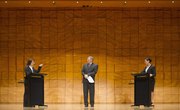Writing a good critical analysis requires you to familiarize yourself with facts associated with the topic and with the prevailing opinions on the topic, and to practice the fundamentals of fair thinking and reason.
Once you develop your ability to write sound analytical essays, you will probably discover that you also have learned to think more objectively about many things, including what you hear on the news, in advertising, in casual conversation and in other ways.
In short, writing analytical essays teaches analytical thinking.
Step 1
Make distinctions in your resource materials between fact and opinion. If a statement is objective and provable, it's a fact. You can look up a fact in a reliable resource.
If a statement is subjective, it's an opinion. If you state an opinion, rather than point to a factual source, you have to argue it; however, as the University of Alabama's Center for Teaching and Learning points out, solid opinions are based on facts, and solid critical essays voice only solid opinions.
Step 2
Check facts to see if they are trustworthy before using them in your essay, advises University of Alabama's Center for Teaching and Learning.
If, for example, a number sounds too small or too big, you must look it up. Or, a resource may make a statement such as "the housing market is depressed" that you suspect is based on outdated information.
The statement may have been true in 2009, when both sales and home prices were down compared to recent previous years, but is it true now?
You need to look up and use current information.
Step 3
Use information from trustworthy, objective sources only.
A statement about the efficacy of a diet aid that comes from the company that produces and sells it could be very different from a statement on the same product that comes from the Mayo Clinic.
Step 4
Evaluate scientific studies for bias before you use them.
Even seemingly objective studies might be biased. For example: The sponsor of a study may have a vested interest in a certain outcome; or the sample size may have been too small to draw an accurate conclusion; or the study may not have lasted long enough; or it may have asked the wrong questions, or the methodology may have been faulty in some other way.
Step 5
Avoid mining data to prove a point.
This happens when a writer searches established data to support a conclusion at which the writer has already arrived.
That writer is not really trying to discover the truth; the person is only trying to validate the opinion.
Step 6
Use standards that are consistent with the information that is being judged.
If you want to critique a lyrical essay that is meant to provoke a thoughtful reverie, do not apply the standards you would use to evaluate a news article or a mystery when you write your critical analysis.
Step 7
Study logic if you want to write solid analyses.
Learn what a premise is and what fallacies are.
Premises, according to San Jose State University's Institute for Teaching and Learning are true statements that support an argument's conclusion. So, for a conclusion to be true, its premise also must be true.
Logical fallacies are errors in thinking; many have formal names, and you can study them. You probably will start to recognize logical fallacies for what they are when you see or hear them.
Some of the more common fallacies include arguing "ad hominen," which is discounting someone based upon a physical characteristic or an undesirable attribute, making false analogies, arguing from emotion and taking leaps of logic that don't follow what was said previously.
Step 8
Make appropriate distinctions in essays.
For example, many people believe that because an act is illegal, it is morally wrong, but analytical thinkers often make a distinction between what is legally right and what is morally right.
Women's suffrage is an example. It used to be illegal for women to vote, but few people now would argue reasonably that women who vote and those who allow it are immoral.
Step 9
Consider your own motives, and keep fairness in mind.
You are only human, and you sometimes may want to have your opinions validated more than you want to get at the truth.
That can lead to mining the data, taking examples out of context, willfully misinterpreting, using fallacies, ignoring the honest intentions of another or other analytic errors.
As Purdue University's Online Writing Lab points out, writers must accurately and fairly consider the material.
Step 10
Plan ahead and take your time.
Give yourself time to read, to soak up the thinking of others and to seek answers, all the while practicing analytical thinking skills.
Some essays deal in issues that require many weeks worth of study and thought, and some require a day's worth of study and thought.
Related Articles
References
Writer Bio
Cat Reynolds has written professionally since 1990. She has worked in academe (teaching and administration), real estate and has owned a private tutoring business. She is also a poet and recipient of the Discover/The Nation Award. Her work can be found in literary publications and on various blogs. Reynolds holds a Master of Arts in writing and literature from Purdue University.










